
The Chetniks, formally the Chetnik Detachments of the Yugoslav Army, and also the Yugoslav Army in the Homeland and informally colloquially the Ravna Gora Movement, was a Yugoslav royalist and Serbian nationalist movement and guerrilla force in Axis-occupied Yugoslavia. Although it was not a homogeneous movement, it was led by Draža Mihailović. While it was anti-Axis in its long-term goals and engaged in marginal resistance activities for limited periods, it also engaged in tactical or selective collaboration with Axis forces for almost all of the war. The Chetnik movement adopted a policy of collaboration with regard to the Axis, and engaged in cooperation to one degree or another by both establishing a modus vivendi and operating as "legalised" auxiliary forces under Axis control. Over a period of time, and in different parts of the country, the movement was progressively drawn into collaboration agreements: first with the puppet Government of National Salvation in the German-occupied territory of Serbia, then with the Italians in occupied Dalmatia and Montenegro, with some of the Ustaše forces in northern Bosnia, and, after the Italian capitulation in September 1943, with the Germans directly.
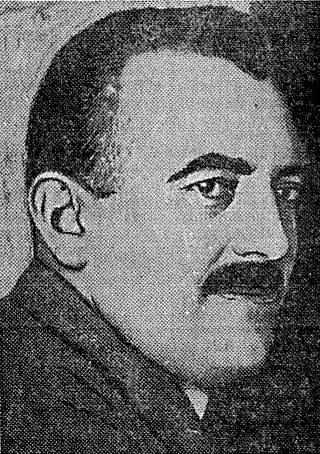
Puniša Račić was a Serb leader and People's Radical Party (NRS) politician. He assassinated Croatian Peasant Party (HSS) representatives Pavle Radić and Đuro Basariček and mortally wounded HSS leader Stjepan Radić in a shooting which took place on the floor of the Yugoslav parliament on 20 June 1928. He was tried and handed a 60-year sentence, which was immediately reduced to twenty years. He served most of his sentence under house arrest and was killed by the Yugoslav Partisans in October 1944.
The Anti-Fascist Council for the National Liberation of Yugoslavia, commonly abbreviated as the AVNOJ, was a deliberative and legislative body that was established in Bihać, Yugoslavia, in November 1942. It was established by Josip Broz Tito, the leader of the Yugoslav Partisans, an armed resistance movement led by the Communist Party of Yugoslavia to resist the Axis occupation of the country during World War II.

Dimitrije Ljotić was a Serbian and Yugoslav fascist politician and ideologue who established the Yugoslav National Movement (Zbor) in 1935 and collaborated with German occupational authorities in the Territory of the Military Commander in Serbia during World War II.

Operation Uzice was the first major counter-insurgency operation by the German Wehrmacht on the occupied territory of the Kingdom of Yugoslavia during World War II. The operation was directed against the Užice Republic, the first of several "free territories" liberated by the Yugoslav Partisans. It was named after the town of Užice, and is associated with the First Enemy Offensive in Yugoslavian historiography. The security forces of the German-installed puppet regime of Milan Nedić also participated in the offensive.

The Yugoslav National Movement, also known as the United Militant Labour Organization, was a Yugoslav fascist movement and organization led by politician Dimitrije Ljotić. Founded in 1935, it received considerable German financial and political assistance during the interwar period and participated in the 1935 and 1938 Yugoslav parliamentary elections, in which it never received more than 1 percent of the popular vote.

The Serbian State Guard, also known as the Nedićevci, was a collaborationist paramilitary force used to impose law and order within the German occupied territory of Serbia during World War II. It was formed from two former Yugoslav gendarmerie regiments, was created with the approval of the German military authorities, and for a long period was controlled by the Higher SS and Police Leader in the occupied territory. It assisted the Germans in imposing one of the most brutal occupation regimes in occupied Europe and helped guard and execute prisoners at the Banjica concentration camp in Belgrade. Its leaders and much of the rank and file were sympathetic to the Chetnik movement of Draža Mihailović, and it was purged by the Germans on several occasions for that reason. In October 1944, as the Soviet Red Army closed on Belgrade, the SDS was transferred to Mihailović's control by a member of the fleeing Nedić administration, but it quickly disintegrated during its withdrawal west, with only a small number of former SDS members being captured by the British near the Italian-Yugoslav border in May 1945.

Velibor Jonić was a Serbian fascist politician and government minister in the Territory of the Military Commander in Serbia during World War II. He taught at the Military Academy in Belgrade and at the Yugoslav royal court before the war. He was also the secretary-general of Zbor, a Yugoslav fascist movement. He became the Serbian Commissioner of Education on 10 July 1941. He was tried for collaboration by the communists following the war, was sentenced to death and executed in July 1946.
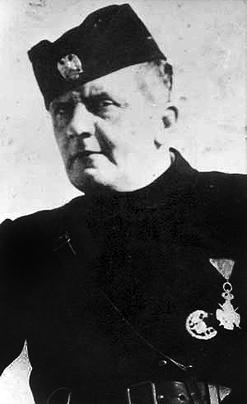
Dobroslav Jevđević was a Bosnian Serb politician and self-appointed Chetnik commander in the Herzegovina region of the Axis-occupied Kingdom of Yugoslavia during World War II. He was a member of the interwar Chetnik Association and the Organisation of Yugoslav Nationalists, a Yugoslav National Party member of the National Assembly, and a leader of the opposition to King Alexander between 1929 and 1934. The following year, he became the propaganda chief for the Yugoslav government.
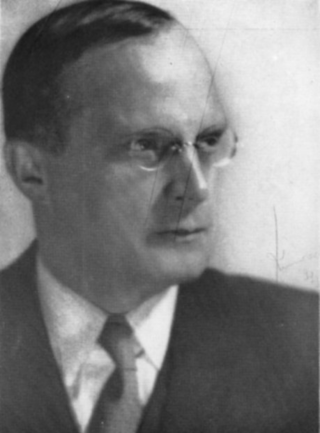
Juraj Krnjević was a Croatian politician who was among the leaders of the Croatian Peasant Party (HSS). He was the party's General Secretary since 1928 and President since 1964. He also served as the First Deputy Prime Minister and Minister of Post, Telegraph and Telephone of Yugoslavia between 1942 and 1943.
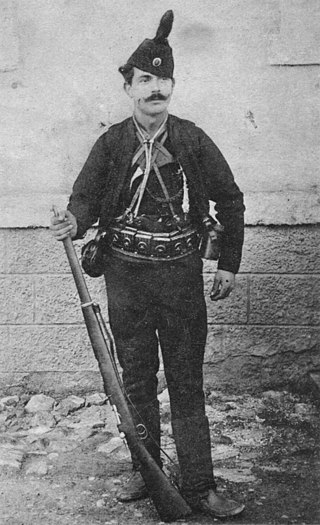
Ilija Trifunović-Birčanin was a Serbian Chetnik military commander. He took part in the Balkan Wars and World War I and afterwards served as the president of the Association of Serb Chetniks for Freedom and the Fatherland in the Kingdom of Yugoslavia. In the spring of 1942, he was appointed by Mihailović as the commander of Chetniks in Dalmatia, Herzegovina, western Bosnia and southwestern Croatia. He died in Split on 3 February 1943, having suffered from poor health for a considerable period of time.

Milan Grol was a Serbian literary critic, historian and politician. He was also director of the National Theatre in Belgrade.

The Yugoslav coup d'état took place on 27 March 1941 in Belgrade, Kingdom of Yugoslavia, when the regency led by Prince Paul of Yugoslavia was overthrown and King Peter II fully assumed monarchical powers. The coup was planned and conducted by a group of pro-Western Serbian-nationalist Royal Yugoslav Air Force officers formally led by the Air Force commander, General Dušan Simović, who had been associated with several putsch plots from 1938 onwards. Brigadier General of Military Aviation Borivoje Mirković, Major Živan Knežević of the Yugoslav Royal Guards, and his brother Radoje Knežević were the main organisers in the overthrow of the government. In addition to Radoje Knežević, some other civilian leaders were probably aware of the takeover before it was launched and moved to support it once it occurred, but they were not among the organisers. Peter II himself was surprised by the coup, and heard of the declaration of his coming-of-age for the first time on the radio.

The Government of National Salvation, also referred to as Nedić's government or Nedić's regime, was the colloquial name of the second Serbian collaborationist puppet government established after the Commissioner Government in the German-occupied territory of Serbia during World War II in Yugoslavia. Appointed by the German Military Commander in Serbia, it operated from 29 August 1941 to 4 October 1944. Unlike the Independent State of Croatia, the regime in occupied Serbia was never accorded status in international law and did not enjoy formal diplomatic recognition of the Axis powers.

Petar Baćović was a Bosnian Serb Chetnik commander within occupied Yugoslavia during World War II. From the summer of 1941 until April 1942, he headed the cabinet of the Ministry of Internal Affairs for Milan Nedić's puppet Government of National Salvation in the German-occupied territory of Serbia. In May and June 1942, Baćović participated in the joint Italian-Chetnik offensive against the Yugoslav Partisans in Montenegro. In July 1942, Baćović was appointed by the Chetnik leader Draža Mihailović and his Supreme Command as the commander of the Chetnik units in the regions of eastern Bosnia and Herzegovina within the Axis puppet state, the Independent State of Croatia. In this role, Baćović continued collaborating with the Italians against the Yugoslav Partisans, with his Chetniks formally recognised as Italian auxiliaries from mid-1942.
The Serbian Cultural Club was a short-lived but influential grouping of mainly Belgrade-based Serb intellectuals of the Kingdom of Yugoslavia in the years immediately before the outbreak of World War II. The organization pushed for the advance of Serbian national interest in Yugoslavia, following Croatian autonomy (1939). After the invasion of Yugoslavia in April 1941, the president of the SKK, Slobodan Jovanović went into exile with the government, but several members remained behind in Yugoslavia and developed a Serb-centric ideological framework for the Chetniks of Draža Mihailović.
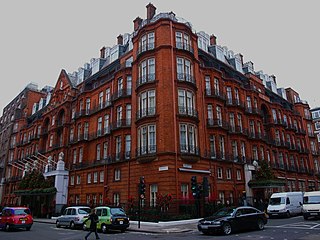
The Government of the Kingdom of Yugoslavia in Exile was an official government-in-exile of Yugoslavia, headed by King Peter II. It evacuated from Belgrade in April 1941, after the Axis invasion of the country, and went first to Greece, then to Palestine, then to Egypt, and finally, in June 1941, to the United Kingdom. Hence, it is also referred to as the "Government in London". It was dissolved in March 1945.

Božidar Purić was a Serbian and Yugoslav politician and diplomat. Between 1928 and 1934 he was a chargé d'affaires in the Embassy of Kingdom of Yugoslavia in the United States. and its ambassador in France since 1935. During the World War II, Purić was the prime minister of the Yugoslav government-in-exile between 10 August 1943 and 8 July 1944.
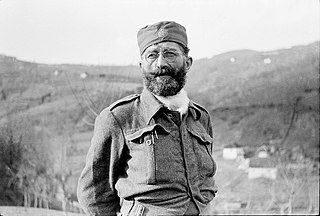
The Ba Congress, also known as the Saint Sava Congress or Great People's Congress, was a meeting of representatives of Draža Mihailović's Chetnik movement held between 25 and 28 January 1944 in the village of Ba in the German-occupied territory of Serbia during World War II. It sought to provide a political alternative to the plans for post-war Yugoslavia set out by the Chetniks' rivals, the communist-led Yugoslav Partisans, and attempted to reverse the decision of the major Allied powers to provide their exclusive support to the Yugoslav Partisans while withdrawing their support of the Chetniks.

During World War II, the Croatian Peasant Party splintered into several factions pursuing different policies and alliances. Prior to the German invasion of Yugoslavia, it was the most powerful political party among ethnic Croats, controlled the administration and police in Banovina of Croatia, and commanded two paramilitary organisations. After the successful invasion of the Kingdom of Yugoslavia in April 1941, Nazi Germany proposed that HSS leader Vladko Maček could rule Croatia as a puppet state. He declined, but the Ustaše agreed and proclaimed the Independent State of Croatia. Under duress, Maček called on Croats to support the regime. A splinter of the HSS and all HSS-controlled infrastructure went over to the Ustaše.


















